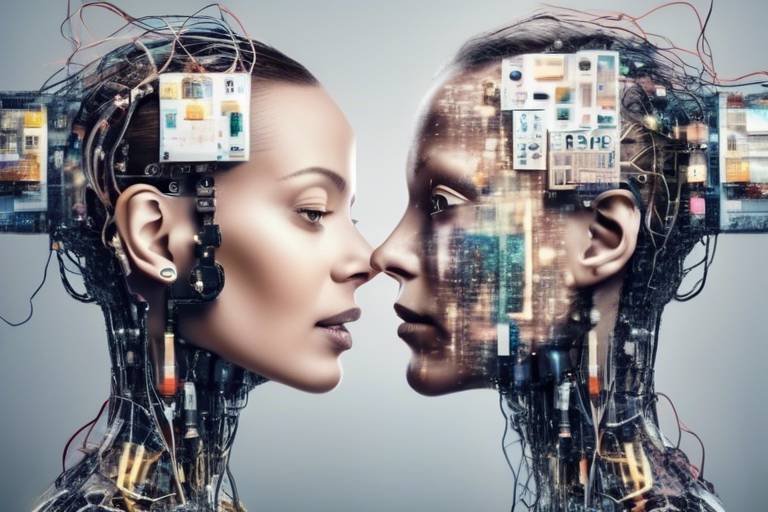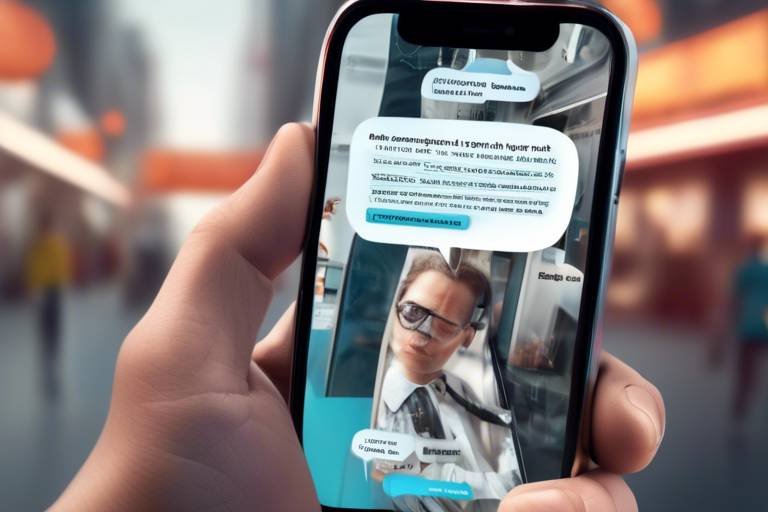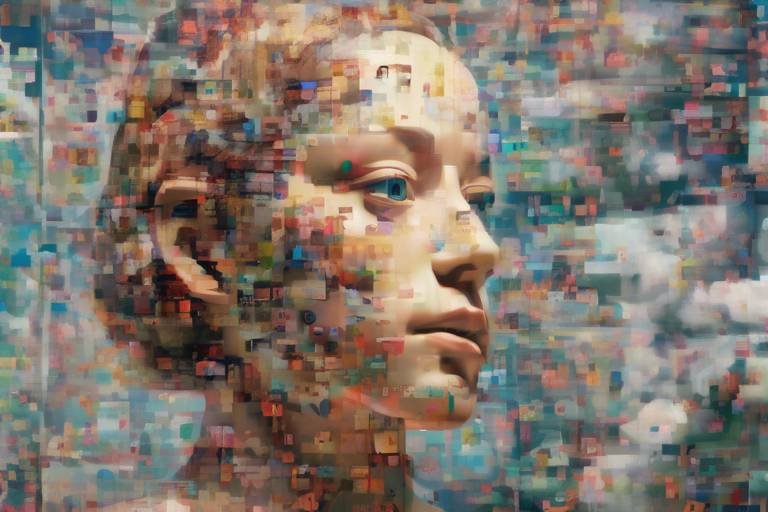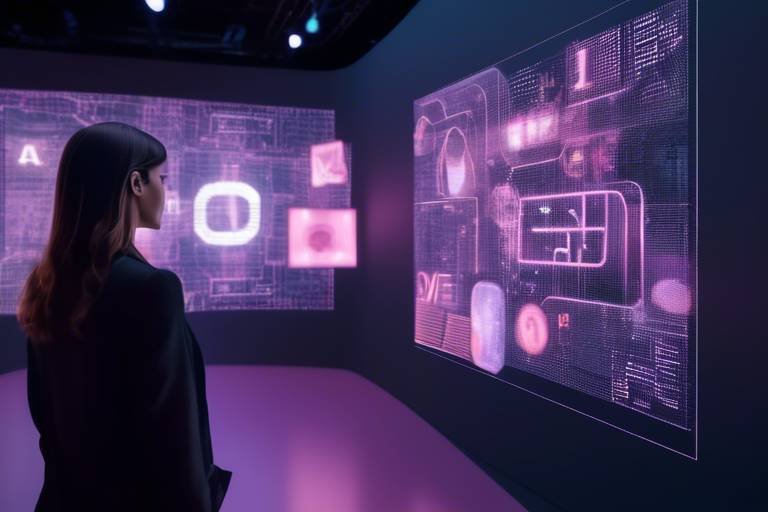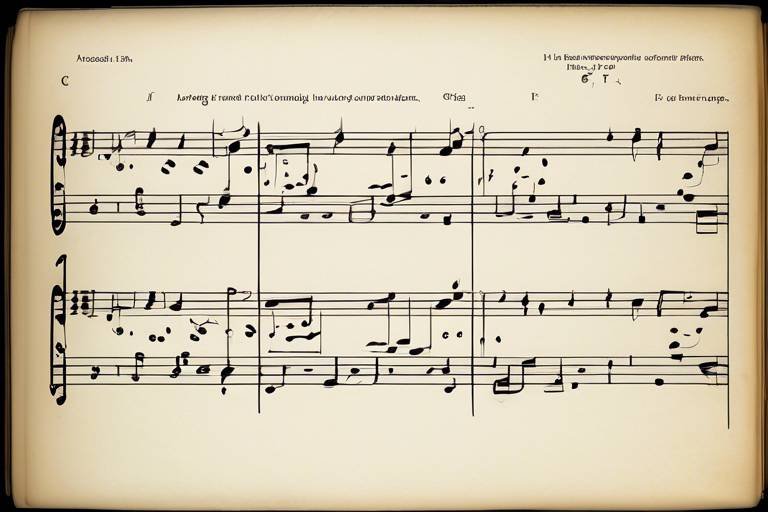Creative Algorithms: AI in Literature
Have you ever wondered how artificial intelligence is reshaping the world of literature? The intersection of AI and storytelling is not just a futuristic concept—it's happening right now! With the rise of sophisticated algorithms, writers are discovering new horizons in creativity that were previously unimaginable. This article delves into the fascinating ways in which AI is transforming the literary landscape, enhancing not only the creative process but also the very essence of storytelling itself.
Imagine a world where your favorite novel could be co-written by a machine, blending human emotion with algorithmic precision. This is no longer a mere fantasy; it’s the reality that authors are beginning to embrace. The advent of AI technologies has allowed writers to push the boundaries of traditional literature, experimenting with styles and formats that were once thought to be the sole domain of human creativity. As we explore the impact of AI on literature, we will uncover how these innovations are not just tools but partners in the creative process.
In this brave new world, algorithms are becoming co-authors, collaborating with writers to generate ideas, plot twists, and entire narratives. This partnership is leading to innovative literary works that challenge our understanding of authorship and creativity. The lines between human and machine-generated content are blurring, prompting us to ask: what does it mean to be an author in the age of AI? How do we define originality when machines can produce text that is indistinguishable from that written by humans?
As we dive deeper into this topic, we will explore the mechanics of Natural Language Processing (NLP), which enables machines to understand and generate human language. This technology is revolutionizing how writers approach their craft, providing them with tools to enhance their narratives. From suggesting phrases to improving grammar, NLP is like having a personal editor at your fingertips, allowing for a smoother and more engaging writing experience.
Moreover, the future of AI in literature looks promising, with potential for fully immersive storytelling experiences that adapt to reader choices. This interactive approach not only captivates readers but also invites them to participate in the narrative, creating a unique bond between the story and its audience. As AI continues to evolve, we can expect to see the emergence of new literary genres that blend traditional storytelling with cutting-edge technology, pushing the envelope of what literature can be. Are you ready to explore this exciting frontier?
- What is AI in literature? AI in literature refers to the use of artificial intelligence technologies, such as algorithms and natural language processing, to assist in the creative writing process and storytelling.
- How does AI collaborate with authors? AI can generate ideas, suggest plot developments, and even write entire sections of text, acting as a co-author and enhancing the creative process.
- What are the ethical implications of AI in literature? The integration of AI raises questions about authorship, originality, and potential biases in generated content, prompting discussions about the responsibilities of both writers and technologists.
- What does the future hold for AI in literature? The future promises even more profound changes, including interactive storytelling experiences and the emergence of new genres that blend technology with traditional narratives.

The Rise of AI in Creative Writing
The world of creative writing is undergoing a remarkable transformation, and at the heart of this evolution is artificial intelligence. As writers seek to push the boundaries of their craft, AI has emerged as a powerful tool that enhances creativity and expands possibilities. Imagine a world where authors can experiment with styles they've never tried before, or where they can craft narratives that blend reality with the fantastic—this is the new frontier of storytelling. With AI stepping into the creative arena, writers are no longer limited by traditional methods; instead, they are empowered to explore new formats and innovative approaches to their work.
AI's role in creative writing has surged in recent years, largely due to advancements in machine learning and natural language processing. These technologies enable algorithms to analyze vast amounts of text, learning from the intricacies of human expression. This capability allows AI to assist authors in ways that were previously unimaginable. For instance, writers can now receive real-time suggestions for plot development, character arcs, and even dialogue, all tailored to their unique voice. It’s like having a brainstorming partner who never runs out of ideas!
Moreover, the integration of AI into the writing process is not just about efficiency; it's about enhancing creativity. By taking care of mundane tasks such as grammar checks or formatting, AI frees up writers to focus on what they do best: crafting compelling stories. This collaboration between human and machine has led to the emergence of new literary styles, where the line between author and algorithm blurs. Some authors have even reported feeling inspired by the unexpected twists and suggestions offered by AI, leading to narratives that are richer and more complex than they could have created alone.
As AI continues to evolve, it opens the door to a plethora of opportunities for writers. The possibilities are endless, ranging from interactive storytelling to personalized narratives. For example, AI can analyze reader preferences and adapt stories in real-time, creating a unique experience for each individual. This level of customization not only enhances engagement but also invites readers to become active participants in the storytelling process.
In summary, the rise of AI in creative writing is not merely a trend; it represents a fundamental shift in how stories are conceived and told. As authors embrace these technologies, they are discovering new avenues for expression and creativity. The collaboration between human intuition and machine intelligence promises to redefine the literary landscape, making it an exciting time to be both a writer and a reader.
- How does AI assist in the writing process? AI can provide suggestions for plot development, character creation, and even dialogue, making the writing process more efficient and creative.
- Can AI generate entire stories? Yes, AI can generate narratives based on prompts, allowing writers to explore new ideas and directions.
- Is AI a threat to traditional authorship? While AI can assist in the writing process, it is meant to be a tool that enhances human creativity rather than replace it.
- What ethical concerns arise from using AI in literature? Issues such as authorship, originality, and potential bias in AI-generated content are important considerations for writers and technologists alike.

Algorithms as Co-Authors
The literary landscape is undergoing a remarkable transformation, thanks to the emergence of . Imagine sitting at your writing desk, coffee in hand, and having an intelligent partner who never tires, always has fresh ideas, and can generate plot twists that leave you breathless. This is not a scene from a sci-fi novel; it’s the reality for many modern authors who are embracing the capabilities of artificial intelligence to enhance their creative process. By leveraging machine learning, writers can now tap into a wealth of possibilities that were previously unimaginable.
One of the most exciting aspects of using AI as a co-writer is the ability to generate ideas that might not have crossed a human's mind. Picture this: you're brainstorming for your next novel, and suddenly your AI collaborator suggests a plot twist involving time travel and an alternate universe. Sounds intriguing, right? This collaboration allows authors to push the boundaries of their creativity, leading to innovative literary works that blend human intuition and algorithmic precision.
Moreover, AI can analyze vast amounts of data from existing literature, identifying patterns and tropes that resonate with readers. This capability not only helps in developing compelling plots but also ensures that the stories created are relevant and engaging. For example, an AI could analyze the most popular themes in contemporary fiction and suggest how to incorporate them into your narrative without losing your unique voice. This fusion of data-driven insights and personal storytelling creates a rich tapestry of literature that appeals to a broader audience.
However, the collaboration between authors and algorithms isn't without its challenges. Questions about authorship and originality arise as writers begin to rely more heavily on AI-generated content. Who gets the credit for a story that was partly created by a machine? Is the work still considered original if it's been influenced by algorithms? These are questions that the literary community must grapple with as AI continues to evolve.
As we delve deeper into the realm of AI-assisted writing, it becomes clear that this technology is not just a tool but a partner in the creative process. The possibilities are endless, and as authors learn to harness the power of algorithms, we can expect to see a new wave of literature that challenges our perceptions of storytelling. The future of writing is here, and it's time to embrace our new co-authors.
- Can AI really write a novel? Yes, AI can generate text and assist in writing, but the final creative decisions and emotional depth typically come from human authors.
- What are the ethical implications of using AI in literature? There are concerns about authorship, originality, and the potential for bias in AI-generated content.
- How can authors ensure their unique voice remains intact when using AI? Authors can use AI as a tool for inspiration and idea generation while maintaining control over their narrative and style.
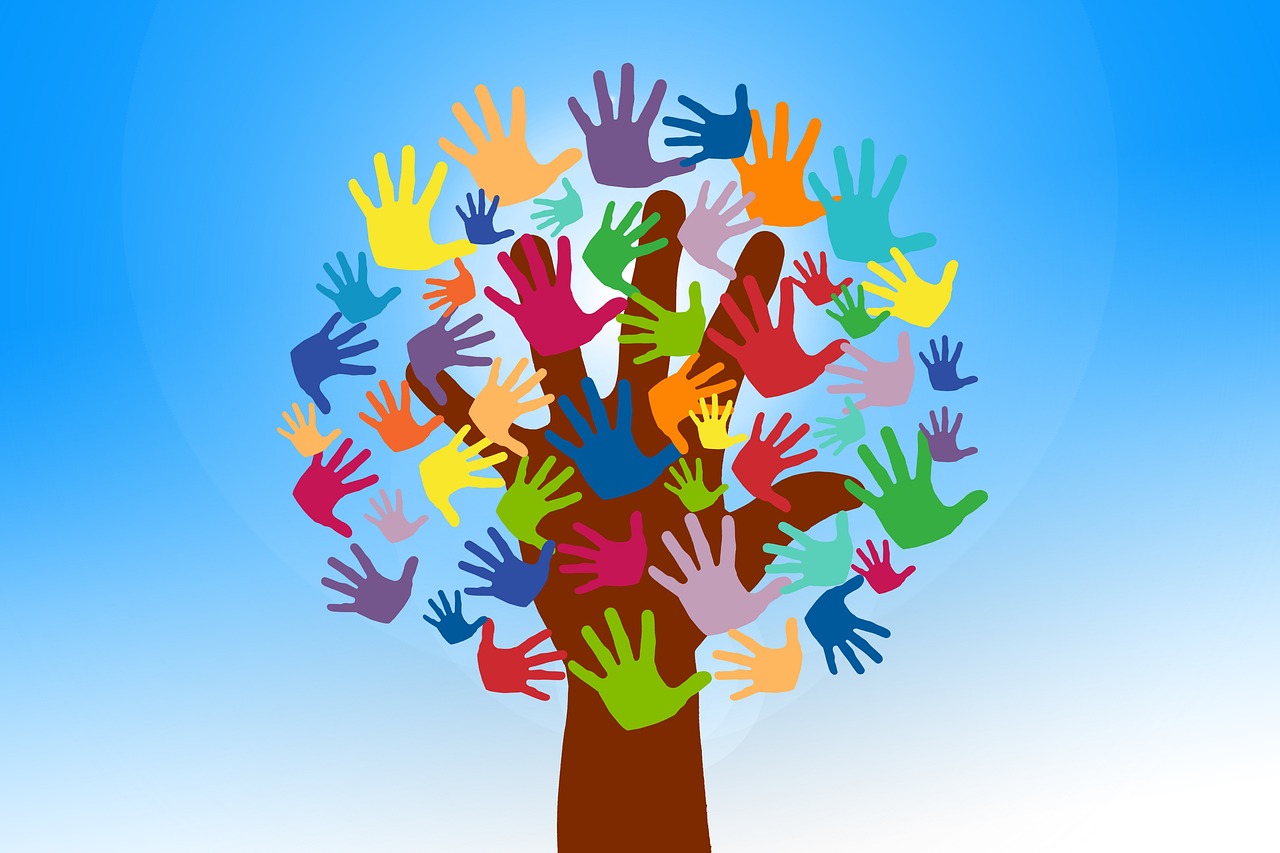
Understanding Natural Language Processing
Natural Language Processing, or NLP, is a fascinating field at the intersection of computer science, artificial intelligence, and linguistics. It's like teaching machines to understand our language in the same way we do. Imagine having a conversation with a friend who knows exactly what you're talking about, picking up on nuances and emotions. That’s the goal of NLP! By breaking down human language into manageable data, machines can learn to analyze, interpret, and even generate text that feels surprisingly human-like.
The power of NLP lies in its ability to process vast amounts of text quickly and efficiently. This technology is not just about understanding words; it’s about grasping context, sentiment, and intent. For example, consider how a simple phrase can change meaning based on context. The sentence "I can't believe you did that!" can express surprise, frustration, or even admiration. NLP algorithms are designed to discern these subtleties, making them incredibly useful for writers looking to enhance their narratives.
Moreover, NLP encompasses various techniques that allow AI to assist writers in numerous ways. Here are some key functionalities:
- Grammar and Style Suggestions: NLP tools can analyze text for grammatical errors and suggest improvements, helping writers polish their work.
- Content Generation: By leveraging NLP, AI can generate ideas, plot twists, or even entire paragraphs that align with the writer's style.
- Sentiment Analysis: This allows writers to gauge how their audience might react to certain phrases or themes, refining their storytelling approach.
As writers navigate the creative process, NLP acts as a supportive partner, providing insights and suggestions that can lead to richer, more engaging narratives. It's like having a brainstorming buddy who never runs out of ideas! However, it’s essential to remember that while NLP can offer valuable assistance, the human touch remains irreplaceable. After all, no algorithm can replicate the unique perspective and emotional depth that only a human writer can bring to the table.
In summary, understanding NLP is crucial for writers looking to embrace the full potential of AI in literature. By harnessing this technology, authors can enhance their storytelling capabilities, making their work more compelling and relatable. As we continue to explore the creative landscape shaped by AI, NLP will undoubtedly play a pivotal role in pushing the boundaries of what literature can be.
Q: What is Natural Language Processing?
A: Natural Language Processing (NLP) is a branch of artificial intelligence that focuses on the interaction between computers and humans through natural language. It enables machines to understand, interpret, and generate human language in a valuable way.
Q: How does NLP help writers?
A: NLP assists writers by providing grammar and style suggestions, generating content ideas, and analyzing sentiment, which can enhance the overall quality of their narratives.
Q: Can AI completely replace human writers?
A: While AI can assist in the writing process, it cannot fully replace human writers. The unique perspectives, emotions, and creativity that humans bring to storytelling are irreplaceable.
Q: What are some tools that utilize NLP?
A: Some popular NLP tools include Grammarly for grammar checking, Jasper for content generation, and Google’s BERT for understanding context in search queries.

Text Generation Models
Text generation models, particularly those powered by advanced artificial intelligence, have become a game-changer in the realm of creative writing. Imagine having a virtual collaborator that can help you brainstorm ideas, develop plots, and even draft entire chapters! This is exactly what models like GPT-3 and others bring to the table, enabling writers to push the boundaries of their creativity. These models are designed to understand context, generate human-like text, and adapt to various writing styles, making them invaluable tools for authors.
At the heart of these models lies a complex architecture that utilizes deep learning techniques to analyze vast amounts of text data. By doing so, they learn the intricacies of language, including grammar, tone, and style. This learning process allows them to generate coherent and contextually relevant text that can seamlessly blend with a writer's voice. For instance, a novelist might use a text generation model to explore different narrative paths, experimenting with various character arcs and settings without the constraints of traditional brainstorming methods.
One of the most fascinating aspects of these models is their ability to produce content that is not only original but also tailored to specific genres. Whether it's crafting a gripping thriller, a heartwarming romance, or a thought-provoking science fiction piece, AI can assist writers in exploring new possibilities. Here’s how:
- Idea Generation: Writers can input a prompt or theme, and the model generates multiple ideas or storylines, providing a rich well of inspiration.
- Style Adaptation: By analyzing existing works, these models can mimic the style of a particular author or genre, allowing for a unique blend of influences.
- Rapid Prototyping: Authors can quickly draft and iterate on their ideas, making the writing process more efficient and less daunting.
However, while text generation models offer exciting possibilities, they also come with challenges. The quality of output can vary, and there are concerns about authenticity and originality in works produced with AI assistance. Writers must remain vigilant, ensuring that their unique voice and creative intent shine through, even when leveraging these powerful tools. It’s a delicate balance between harnessing technology and maintaining the essence of human storytelling.
In summary, text generation models represent a remarkable intersection of technology and creativity. They empower writers to explore new horizons, streamline their processes, and ultimately enhance the storytelling experience. As these models continue to evolve, they will likely play an even more significant role in shaping the future of literature.
- What are text generation models? Text generation models are AI systems designed to produce coherent and contextually relevant text based on input prompts.
- How can writers benefit from using AI in their writing? Writers can use AI to brainstorm ideas, generate plotlines, and draft content quickly, enhancing their creative process.
- Are there any ethical concerns with using AI in literature? Yes, issues such as authorship, originality, and potential bias in AI-generated content are important considerations for writers and technologists alike.

AI-Driven Plot Development
Imagine sitting down to write your next big novel, but instead of staring blankly at a blank page, you have a clever assistant by your side. This is the magic of . With the help of sophisticated algorithms and machine learning, authors can now tap into a wealth of data to craft compelling narratives that captivate readers. AI analyzes existing stories, identifies successful tropes, and even predicts what elements resonate most with audiences. It's like having a literary GPS that guides you through the winding roads of storytelling.
One of the most exciting aspects of AI in plot development is its ability to spot patterns and trends across various genres. For instance, if a writer is exploring the mystery genre, AI can sift through thousands of mystery novels to highlight common plot structures, character archetypes, and pacing techniques that have historically engaged readers. This allows authors to innovate while still adhering to the elements that make a story compelling. In essence, AI becomes a collaborative partner, enhancing the creative process rather than overshadowing it.
Moreover, AI can facilitate brainstorming sessions that lead to unexpected plot twists and turns. By generating a plethora of ideas based on a writer’s initial concept, AI can provide a fresh perspective that might not have been considered otherwise. This can be particularly useful for seasoned writers who may find themselves stuck in a creative rut. With AI's ability to generate diverse outcomes, writers can explore multiple narrative paths, ultimately leading to a richer storytelling experience.
As we delve deeper into the realm of AI-driven plot development, it's essential to consider how this technology can also help in refining the overall narrative structure. For example, AI tools can analyze story arcs, ensuring that the pacing aligns with reader expectations. They can suggest where to build tension, when to release it, and how to create cliffhangers that keep readers on the edge of their seats. This level of analysis can transform a good story into a great one, as it aligns with the psychological triggers that engage audiences.
However, while the benefits are numerous, it’s crucial for writers to maintain their unique voice and vision. AI should be seen as a tool that complements human creativity rather than a replacement. The heart of storytelling lies in the human experience, and no algorithm can replicate the emotional depth and nuance that comes from lived experiences. Therefore, the best outcomes arise when authors harness the power of AI while infusing their personal touch into the narrative.
In conclusion, AI-driven plot development represents a thrilling frontier in the literary world. By combining the analytical prowess of algorithms with the imaginative capabilities of human writers, we are witnessing the dawn of a new era in storytelling. This collaboration not only enhances the creative process but also enriches the reader's experience, paving the way for innovative and engaging literature that captivates audiences like never before.
- Can AI write an entire novel on its own? While AI can generate text and assist in plot development, it lacks the emotional depth and creativity that human authors bring to their work.
- How does AI understand storytelling? Through Natural Language Processing, AI analyzes vast amounts of text to identify patterns, structures, and themes prevalent in successful narratives.
- Is using AI in writing considered cheating? Many see AI as a collaborative tool that enhances creativity rather than a shortcut that undermines the writing process.
- What are the ethical concerns surrounding AI in literature? Issues such as authorship, originality, and potential bias in AI-generated content are critical discussions in the literary community.

Ethical Considerations in AI Literature
The rise of artificial intelligence in literature has opened up a Pandora's box of ethical dilemmas. As we embrace the capabilities of AI to assist in creative writing, we must also grapple with the implications of this technology on authorship, originality, and the potential biases that may seep into AI-generated content. The question arises: who truly owns a story crafted with the help of an algorithm? Is it the author who provides the initial spark of creativity, or the machine that generates the bulk of the narrative? These questions challenge our traditional notions of creativity and intellectual property.
Moreover, the algorithms that power AI are not infallible; they are products of the data they are trained on. If that data contains biases—whether cultural, racial, or gender-based—those biases can manifest in the stories produced by AI. This raises concerns about the representation of diverse voices in literature. Are we inadvertently perpetuating stereotypes or excluding marginalized perspectives when we rely on AI for storytelling? Writers and technologists must work together to ensure that the datasets used to train these algorithms are inclusive and representative of the rich tapestry of human experience.
Another critical consideration is the impact of AI on the writing profession itself. With AI tools becoming increasingly sophisticated, there is a fear that the role of the human writer may diminish. Will aspiring authors be overshadowed by algorithms that can churn out content at lightning speed? Or will AI serve as a tool that empowers writers to enhance their craft rather than replace them? The future of literature may depend on how we navigate these ethical waters, balancing innovation with the preservation of human creativity.
To address these ethical concerns, it is essential for writers, AI developers, and policymakers to engage in ongoing dialogue. Establishing clear guidelines and ethical frameworks can help mitigate risks associated with AI in literature. Here are some key points to consider:
- Transparency: Writers should disclose when AI has been used in the creation of their work, allowing readers to understand the role of technology in the storytelling process.
- Accountability: Developers must take responsibility for the biases embedded in their algorithms and strive to create more equitable AI systems.
- Inclusivity: Ensuring diverse voices are represented in the datasets used to train AI can help produce richer, more varied narratives.
As we move forward, embracing AI's potential while being mindful of its ethical implications will be crucial in shaping the future of literature. By fostering a collaborative relationship between human creativity and machine intelligence, we can create a literary landscape that is not only innovative but also responsible and inclusive.
1. What are the main ethical concerns surrounding AI in literature?
Some of the primary concerns include authorship and ownership issues, the potential for bias in AI-generated content, and the impact on the writing profession.
2. How can we ensure that AI-generated content is free from bias?
By using diverse and representative datasets to train AI systems, we can help mitigate the risk of perpetuating stereotypes and biases in literature.
3. Will AI replace human writers in the future?
While AI can assist in the writing process, it is unlikely to replace human creativity. Instead, it may serve as a valuable tool that enhances the capabilities of writers.

The Future of AI in Literature
The future of AI in literature is not just a passing trend; it's a revolution waiting to unfold. As we stand on the brink of this literary evolution, it’s fascinating to consider how technology will reshape the way we create and consume stories. Imagine a world where storytelling is not just a one-way street, but a vibrant dialogue between the reader and the narrative itself. This is the potential that AI brings to the table, paving the way for fully immersive storytelling experiences that engage the audience like never before.
One of the most exciting prospects of AI in literature is the emergence of interactive storytelling experiences. With advancements in machine learning and natural language processing, we can expect narratives that adapt and evolve based on reader choices. Picture this: you’re reading a story, and at a critical juncture, you get to decide the protagonist's fate. Should they take the risk and confront the antagonist, or play it safe and retreat? Each decision you make could lead to a completely different storyline, making every reading experience unique. This kind of interactivity not only enhances engagement but also fosters a deeper connection between the reader and the story.
Furthermore, AI is poised to expand literary genres in ways we have yet to fully comprehend. Traditional storytelling is already blending with technological elements, giving rise to genres that incorporate virtual reality, augmented reality, and even gamification. These new genres invite readers to not just observe but participate in the narrative. For instance, consider a novel that requires readers to solve puzzles or navigate a virtual landscape to unlock the next chapter. This fusion of literature and technology is creating a new frontier for storytelling, breaking down the barriers of conventional genres.
However, as we embrace these innovations, we must also acknowledge the challenges that come with them. The integration of AI in literature raises important questions about authorship and originality. Who is the true author of a story generated with the help of AI? Is it the machine, the programmer, or the human who provided the initial idea? These ethical considerations will spark ongoing debates in the literary community, pushing writers and technologists to navigate the fine line between creativity and technology.
As we look ahead, it’s clear that the potential for AI in literature is vast. The blending of human creativity with algorithmic precision is only the beginning. We can expect to see AI becoming an integral part of the literary landscape, not just as a tool for writers but as a co-creator of narratives that challenge our perceptions of storytelling. The future of literature is bright, and as we embrace these changes, we open ourselves to a world of possibilities that can redefine how we experience stories.
- How will AI change the way we read? AI will enable interactive storytelling experiences, allowing readers to make choices that influence the narrative.
- What are the ethical implications of AI in literature? The integration of AI raises questions about authorship, originality, and potential biases in generated content.
- Can AI generate quality literature? Yes, AI can assist in generating ideas and narratives, but the quality often depends on the collaboration between human creativity and algorithmic input.
- What new genres are emerging due to AI? AI is leading to the creation of genres that blend traditional storytelling with technological elements, such as virtual reality and interactive narratives.

Interactive Storytelling Experiences
Imagine diving into a story where you don’t just read the words but actively shape the narrative with your choices. This is the magic of interactive storytelling, a groundbreaking approach made possible by artificial intelligence. Gone are the days of passive reading; now, you can become a character in the tale, making decisions that influence the outcome. This shift is not just a gimmick; it’s a profound transformation in how stories are told and experienced.
AI technologies are enabling writers to craft narratives that are dynamic and responsive, offering readers a unique experience tailored to their preferences. With the use of algorithms, stories can adapt in real-time based on the reader's interactions. For instance, if you choose to save a character in peril, the plot evolves, leading to unexpected twists and new paths. This level of engagement not only captivates the audience but also fosters a deeper emotional connection to the story.
One of the most exciting aspects of interactive storytelling is its ability to create personalized narratives. Readers can explore various outcomes based on their choices, leading to multiple endings and endless replayability. This concept can be likened to playing a video game where your decisions dictate the fate of the characters. Just like a game, the narrative can branch out into different directions, creating a rich tapestry of possibilities.
Consider the following key features of interactive storytelling:
- Branching Narratives: Stories that split into different paths based on reader choices.
- Character Development: Characters that evolve and react to the reader’s decisions, leading to a more immersive experience.
- Dynamic Endings: Multiple endings that can change based on the journey the reader takes.
As AI continues to evolve, the potential for even more sophisticated interactive experiences grows. Imagine a future where a story can learn from your preferences and adapt accordingly, creating a narrative that feels uniquely yours. This could lead to a more personalized reading experience, making literature more accessible and enjoyable for everyone.
In essence, interactive storytelling is not just about technology; it’s about redefining the relationship between the reader and the narrative. As we embrace these innovations, we open the door to a world where stories are not merely consumed but lived, offering a profound new way to experience literature.
Q: What is interactive storytelling?
A: Interactive storytelling allows readers to influence the narrative through their choices, creating a personalized experience.
Q: How does AI enhance interactive storytelling?
A: AI enables stories to adapt in real-time based on reader interactions, providing dynamic and engaging narratives.
Q: Can interactive storytelling lead to multiple endings?
A: Yes! Many interactive stories feature branching paths that can result in different outcomes based on the reader's decisions.
Q: Is interactive storytelling suitable for all age groups?
A: Absolutely! Interactive storytelling can be designed for various audiences, making it an enjoyable experience for readers of all ages.
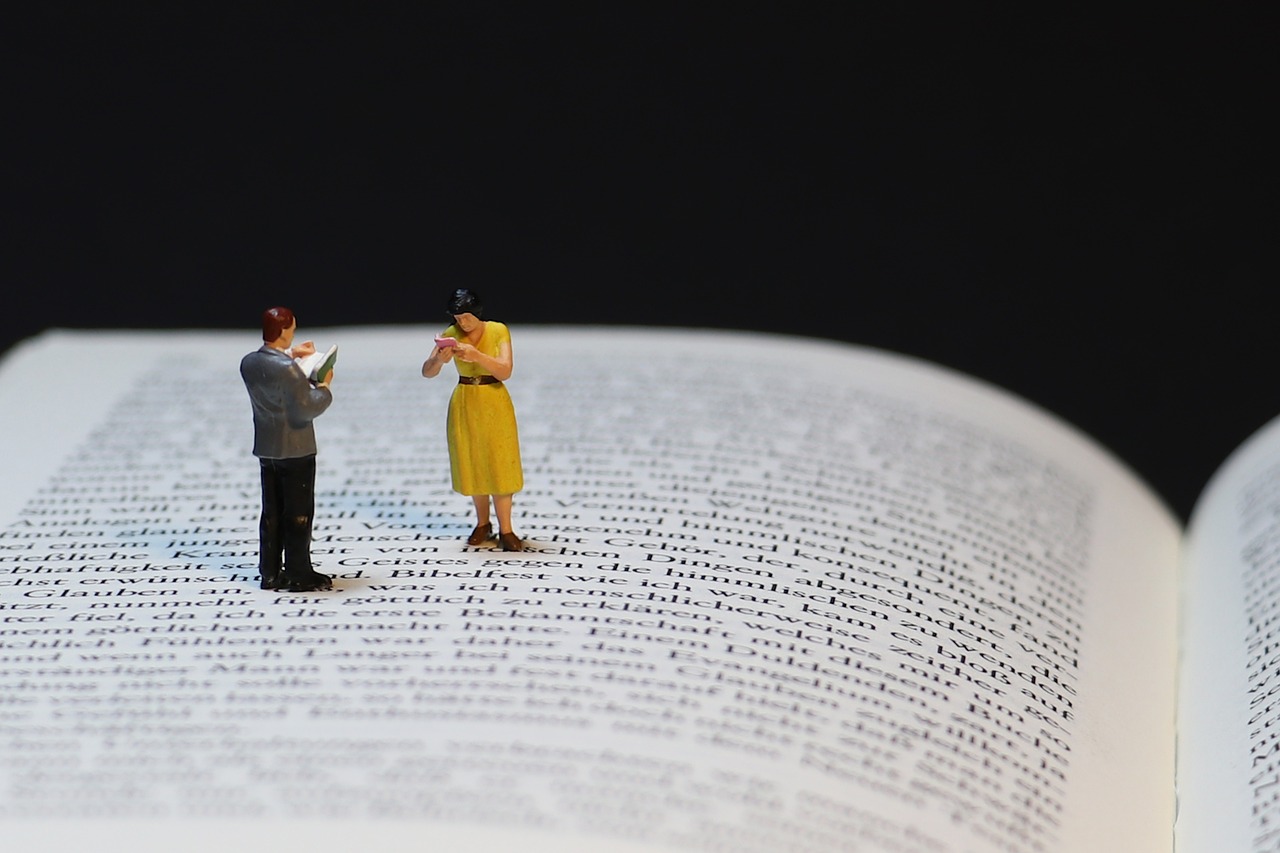
Expanding Literary Genres
The literary landscape is undergoing a fascinating transformation, largely fueled by the integration of artificial intelligence. As writers experiment with new tools and techniques, we are witnessing the emergence of hybrid genres that blend traditional storytelling with innovative technological elements. Imagine a world where the boundaries between genres blur, creating a rich tapestry of narratives that challenge our understanding of literature. This is not just a trend; it’s a revolution in how stories are told and experienced.
AI is not merely a tool; it acts as a catalyst, inspiring authors to explore uncharted territories in their writing. For instance, genres like interactive fiction are gaining traction, allowing readers to influence the plot direction through their choices. This creates a dynamic storytelling experience, where the narrative is not fixed but rather fluid and responsive. Readers are no longer passive consumers; they become co-creators in the storytelling process, which adds a thrilling layer of engagement.
Furthermore, genres such as speculative fiction are being redefined through AI-generated narratives. Writers are leveraging algorithms to generate futuristic scenarios that challenge societal norms and explore complex themes. This not only enriches the genre but also invites readers to ponder profound questions about humanity and technology. The fusion of AI with speculative fiction opens doors to new possibilities, allowing authors to craft stories that resonate with contemporary issues while imagining the future.
Additionally, we see the rise of AI-assisted poetry, where algorithms analyze vast amounts of text to inspire unique poetic forms and styles. This collaboration between human creativity and machine learning results in poetry that can evoke emotions in ways previously unimagined. The interplay of human intuition and algorithmic precision creates an exciting new genre that pushes the limits of poetic expression.
As we look to the future, it’s clear that AI is not just reshaping existing genres but also paving the way for entirely new forms of literature. The potential for multi-sensory storytelling—where readers can experience narratives through text, sound, and visuals—promises to create immersive literary experiences. Imagine reading a story while simultaneously hearing the ambient sounds of the setting or visualizing the characters through augmented reality. This convergence of technology and literature holds the potential to redefine our relationship with storytelling.
In conclusion, the expansion of literary genres through AI is an exhilarating development that invites both authors and readers to explore new horizons. As we embrace these changes, it’s essential to remain curious and open-minded, ready to discover the myriad possibilities that lie ahead in the world of literature.
- How is AI changing traditional literary genres?
AI is facilitating the creation of hybrid genres by blending traditional storytelling with interactive and immersive elements, allowing for more dynamic narratives. - Can AI create original literary works?
Yes, AI can assist in generating original content, but the collaboration between human authors and AI often leads to the most innovative results. - What are the implications of AI in poetry?
AI can analyze existing poetry to inspire new forms and styles, enriching the genre and offering fresh perspectives on poetic expression. - Will AI replace human authors?
While AI can generate content, it is unlikely to replace human authors, as the emotional depth and creativity of human storytelling are irreplaceable.
Frequently Asked Questions
- What is the role of AI in creative writing?
AI is revolutionizing creative writing by providing authors with tools to enhance their storytelling. It allows writers to experiment with different styles and formats, pushing the boundaries of traditional literature. With AI, writers can generate ideas, explore new narratives, and even collaborate with algorithms to create unique literary works.
- How does Natural Language Processing (NLP) assist writers?
NLP enables machines to understand and generate human language. This technology helps writers by suggesting phrases, improving grammar, and enhancing the overall flow of their narratives. By leveraging NLP, authors can streamline their writing process and focus more on creativity than on technical aspects.
- Can AI really co-write stories with humans?
Absolutely! Many authors are now using AI as a co-writer. By utilizing machine learning algorithms, they can generate plot twists, character developments, and even entire narratives. This collaboration leads to innovative storytelling that blends human creativity with the precision of algorithms.
- What ethical concerns arise with AI in literature?
The integration of AI in literature raises significant ethical questions regarding authorship and originality. There's a growing concern about the potential biases in AI-generated content and the responsibility of writers and technologists to address these issues. Discussions around these topics are crucial as we navigate the future of AI in creative fields.
- What does the future hold for AI in literature?
The future of AI in literature is exciting! We can expect more immersive storytelling experiences, where narratives adapt based on reader choices. This interactive storytelling will redefine the reading experience, allowing for personalized narratives that engage readers in ways we've never seen before.
- Will AI create new literary genres?
Yes! The influence of AI is already leading to the emergence of new genres that blend traditional storytelling with technological elements. These innovative forms invite readers to explore literature in fresh and exciting ways, expanding the horizons of what we consider literature.





